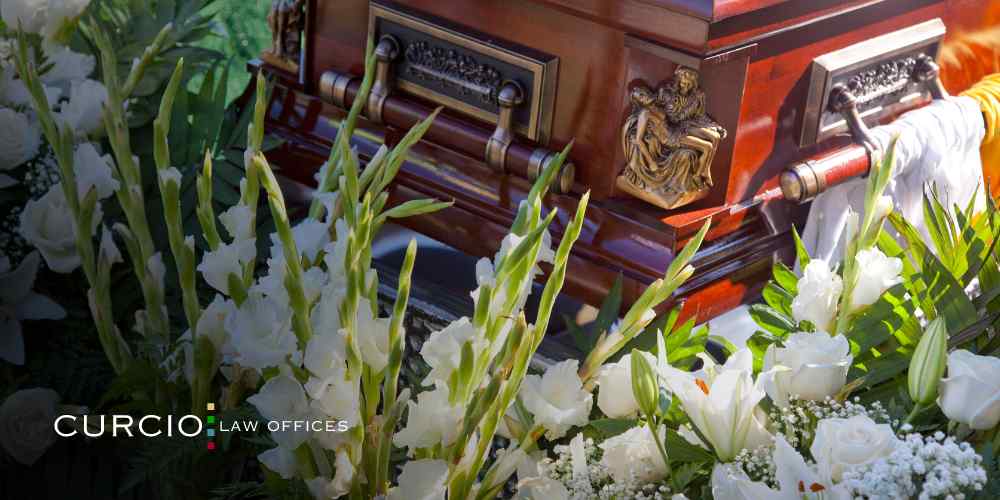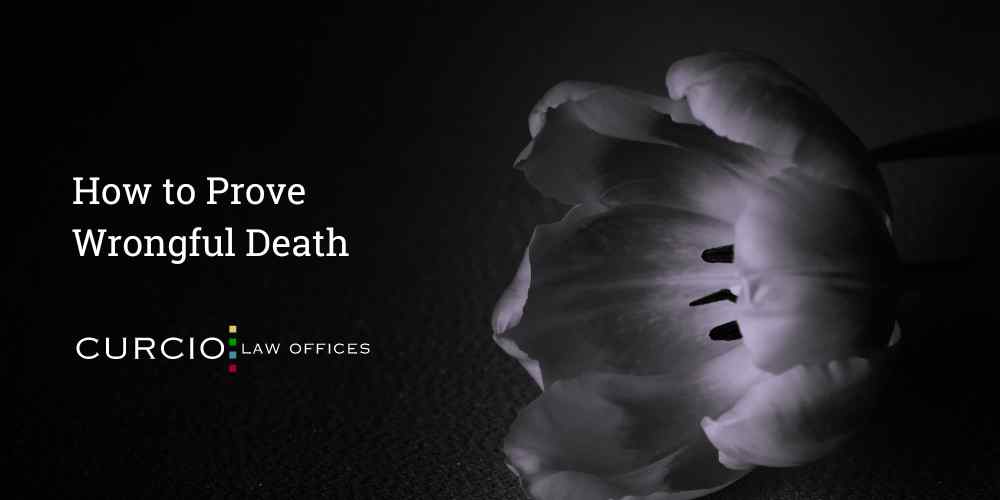When someone dies as a result of another person’s carelessness or intentionally malicious actions, the family of the victim can be left with grief, distress, and unexpected expenses, at no fault of their own. These situations can be devastating, but by filing a wrongful death lawsuit, the victim’s family can pursue justice on their loved one’s behalf and receive compensation for their damages.
If your family member died as a result of another person’s negligence, you may be able to seek compensation by filing a wrongful death claim if you can prove that the victim’s death was actually the result of negligence. Legal fault can be hard to prove, but the Chicago wrongful death lawyers at Curcio & Casciato are here to help with your Chicago wrongful death lawsuit.
If you think you have a wrongful death claim, call us at (312) 321-1111 to schedule a free consultation regarding your potential wrongful death case.
What is Wrongful Death?
When a person dies as a result of someone else’s negligence or malice, their surviving family members can file a wrongful death suit against the person who caused their loved one’s death and recover compensation for their losses.
Wrongful death claims are a lot like personal injury claims, but in a wrongful death claim, the victim isn’t alive to recover compensation from the negligent party. Instead, their immediate family members can seek justice on their deceased relative’s behalf.
While a wrongful death claim can’t bring their loved one back, this civil action can help them cover things like medical and funeral expenses, which can cause undue stress on the family. Wrongful death lawsuits can also help them receive compensation for non-economic losses, like emotional distress and loss of consortium, with the help of a Chicago personal injury attorney.
Common Causes of Wrongful Death

Wrongful death suits can arise from a variety of different situations.
Some causes of wrongful death cases can include:
- Motor vehicle accidents, like car accidents;
- Medical malpractice accidents, like surgical errors;
- Premises liability accidents, like drowning accidents and
- Product liability accidents, like drug accidents.
Parties in a Wrongful Death Lawsuit: Plaintiff vs. Defendant
There are two sides in a wrongful death lawsuit: the plaintiff and the defendant. The plaintiff is the family of the deceased victim, and the defendant is the person accused of being negligent and causing the victim’s death. The deceased victim is also sometimes referred to as the “decedent.”
Oftentimes, the plaintiff will hire a wrongful death lawyer to act as a personal representative for the decedent’s estate in the wrongful death case. The wrongful death lawyer’s job is to help prove that the defendant behaved in a negligent way, which caused the decedent’s death.
To learn more, visit: Wrongful death vs survival action.
How a Civil Wrongful Death Claim Differs From a Criminal Homicide Case
Wrongful death claims are civil lawsuits in which the court decides whether or not the defendant actually behaved negligently and caused the decedent’s death. In criminal prosecution cases, however, the court has to decide whether or not the person is guilty of breaking a federal or state law. While the action that the court is deliberating over is the same, criminal cases and wrongful death cases operate under different rules and have different kinds of consequences.
Burden of Proof
In a legal case, the burden of proof is the degree to which one side of the case has to prove something and different cases are held to different standards, often based on the potential consequences. Paying someone for their losses is a much less severe punishment than losing your freedom, so a criminal case will always involve a higher burden of proof than a civil case.
In a wrongful death claim, the plaintiff (the family members of the deceased person) must gather evidence and provide enough to satisfy the “preponderance of evidence” burden of proof.
This means that the evidence they provide in the wrongful death case proves that something is more likely to be true than not. The plaintiff must prove that there is a greater than 50% chance that the defendant caused the death of their family member in the wrongful death case.
In a criminal case, however, the prosecution (the state or national government) must provide enough evidence to satisfy the “beyond a reasonable doubt” burden of proof, which is the highest standard a case can be held to. This means that in order for the court to declare the defendant guilty, they have to believe that the defendant committed the crime beyond a reasonable doubt.
Consequences
The consequences of a homicide case are almost always going to be more severe than the consequences of a wrongful death civil case. In Illinois, if someone is found guilty of first-degree murder, they could face anywhere between 20-40 years in prison without the possibility of parole.
If someone is found negligent in a wrongful death action, they could be ordered to pay financial compensation to the deceased person’s estate.
Who Can Sue for Wrongful Death in Illinois?
In Illinois, the only people who can sue for wrongful death are the immediate family members of the deceased person. In many cases, it will be a surviving spouse. If a member of your family died as a result of someone else’s actions, you may be able to file a wrongful death lawsuit and receive direct financial support from the negligent person responsible for your loved one’s death, especially if you were financially dependent on the deceased, and the death caused a financial hardship.
How Do You Prove Wrongful Death?

In a wrongful death lawsuit, a lawyer will oftentimes act as a personal representative for the plaintiff, and they will attempt to prove to the court that the defendant was at fault and caused the decedent’s death.
To prove wrongful death, the wrongful death attorney on the case will have to evaluate the situation in which the death occurred and present evidence that proves the victim died as a result of intentional or negligent action.
An Intentional Act Caused the Death
Sometimes, wrongful deaths occur as a result of an intentional, malicious act, like a homicide. If this is the case, the family of the victim may file a wrongful death lawsuit after the defendant’s criminal trial is over, regardless of whether or not they were convicted on any criminal charges.
For example, in the case of O.J. Simpson, he was not found guilty of murder in a criminal trial, but he was found liable for damages in a wrongful death suit.
A Negligent Act Caused the Death
If a person dies as a result of someone else’s negligent behavior, the wrongful death attorney will have to prove that the 4 D’s of negligence were present. These elements include a duty of care, a breach of the duty, causation, and damages.
Negligence is easier to prove in some cases as opposed to others.
For example, it can be easier to prove that a person broke a traffic law and caused an accident, but it can be harder to prove that a doctor committed medical malpractice while their patient was under anesthesia. That’s why it’s so important for the families of victims to hire an experienced attorney to handle wrongful death lawsuits.
Duty of Care
A duty of care is a responsibility that people can have and requires them to provide others with a reasonable level of care.
For example, when someone is driving, they have a duty of care to the other drivers on the road to obey traffic laws and drive cautiously. The plaintiff must prove that the defendant owed the victim a duty of care when the accident occurred.
Breached Duty of Care
A person breaches their duty of care when they act in a way that is dangerous or potentially harmful to others. Using the same example, if a driver violates traffic laws or is driving recklessly, they can be found in breach of their duty of care to others on the road.
Causation
Causation is what ties the negligent action to the victim’s injury. If someone breaches their duty of care to another person and causes harm to that person as a result of their negligence, then they could be found liable for the victim’s injuries.
If someone runs a red light and causes a car accident that harms another driver, they could be found negligent since their breach of duty caused the other driver’s injuries. If the car accident is fatal, then the victim’s family could sue for wrongful death with the help of a Chicago fatal car accident lawyer.
Damages
Damages are the financial and non-financial losses that someone suffers due to negligence. After a fatal accident, if the court finds that the defendant breached their duty of care to another person and caused the victim’s death, the family of the deceased person can recover compensation from the defendant for their damages.
Wrongful death settlement amounts vary, depending on the circumstances surrounding the fatal accident and the percentage of fault of each person involved in the accident.
Economic Damages
In wrongful death settlements, economic damages are the real, tangible financial losses someone has suffered as a result of the decedent’s death.
These can include:
- Medical bills the victim incurred because of the accident;
- Lost wages;
- The average cost to cover funeral and burial expenses;
- Lost financial benefits;
- Loss of future earnings and
- Legal fees.
Non-Economic Damages
The family of the victim can also recover compensation for non-economic damages in a wrongful death settlement. These damages are hard to quantify, but they provide the decedent’s estate with some compensation for them. These non-economic damages can include compensation for:
- Pain and suffering the victim endured before they passed away;
- Loss of consortium, support, and affection; and
- Emotional distress.
For more information about how much can you sue for wrongful death and how to calculate pain and suffering damages, contact a Chicago emotional distress attorney today.
Wrongful Death Statute of Limitations in Illinois
Like any personal injury claim, victims have a limited window of time in which they can pursue a wrongful death action. While state’s laws differ, in Illinois, our state laws dictate that the wrongful death statute of limitations is two years from the date the death occurred unless they died as a result of violent and intentional conduct. In that case, the statute of limitations is five years from the date of the victim’s death.
If your loved one died as a result of negligence, a wrongful death attorney can help you file your claim on time and help ensure you receive the maximum compensation possible.
Curcio & Casciato Handles Wrongful Death Lawsuits
No one wants to file a wrongful death lawsuit–losing a loved one can be one of the worst experiences of a person’s life. That’s why when fatal accidents happen, the victim’s family needs to pursue compensation and hold the negligent party responsible for their actions.
If you have lost a loved one as a result of someone else’s negligence, you should hire a lawyer who can help you with your wrongful death case. An experienced wrongful death lawyer at Curcio & Casciato can help you and your family prove wrongful death and seek justice on behalf of your loved one. Call us at (312) 321-1111 or contact us online to schedule your free consultation with us today.



